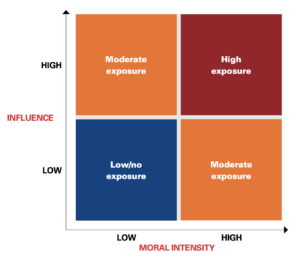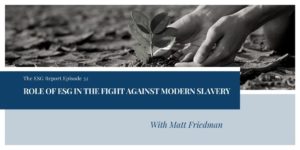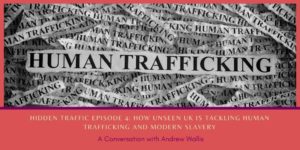The compliance intersection with Environmental, Social, and Corporate Governance (ESG) continues to drive many initiatives in both the ESG realm as well as compliance. One of the key areas is in found in corporate Supply Chain, particularly around human rights, human trafficking and modern slavery. The Uyghur Forced Labor Prevention Act puts additional pressure on companies who do business with China to be able to affirmatively show no goods or services were produced through forced labor involving the Chinese Uyghur population, much to the consternation of the Chinese government. Most compliance professionals depend on language in supplier contracts which certify that no products are the result of slave labor. A New York Times (NYT) piece, entitled U.S. Effort to Combat Forced Labor Targets Corporate China Ties, reported, “One of the biggest hurdles for U.S. businesses is determining whether their products touched Xinjiang at any point in the supply chain. Many companies complain that beyond their direct suppliers, they lack the leverage to demand information from the Chinese firms that manufacture raw materials and parts.” However, that most basic approach is no longer adequate.
In a recent Sloan Management Review article, entitled “Does Your Business Need a Human Rights Strategy?,” authors N. Craig Smith, Markus Scholz and Jane Williams took a solid look at both the risk side of this equation as well developing a corporate strategy to deal with the issue. Over the next couple of blog posts, I will be exploring the article in the context of the compliance professional and a corporate ESG strategy.
While the Chinese response may be painful, it will frankly pale next to the response from the US government and the buying public. With so much increased attention to human rights, the authors believe “businesses that turn a blind eye to violations that occur in their sphere of operations face the risk of being exposed as morally complicit as well as vulnerable to legal action and reputational harm. That’s why it’s critical for companies to have a human rights strategy and proactively consider when and how to take the action needed to fulfill their moral obligations; meet shareholder, customer, and employee expectations; and keep other stakeholders satisfied.”
Three Categories of Human Rights Violations
The authors believe there are three broad categories of human rights issues. They are:
- Abuse in the way a company’s products or services are made or delivered. This includes abuse by suppliers or contractors or within a company’s own operations. Although most western companies believe this is not a problem for them, a UK investigation found a slave labor operation within the country itself, which was supplying food products to such UK retailors as Tesco, Sainsbury’s and others.
- Abuse in the way a company’s products or services are used. This includes companies that find themselves complicit when customers employ their products or services to do so — if not legally complicit, then at least guilty in the court of public opinion. The obvious example here are the digital surveillance systems sold to Chinese security agencies and used to implement a mass surveillance program against minority groups while creating an overall surveillance state within the country.
- Abuse by regimes where the company operates. This may be one of the trickiest to navigate. Obviously working with governments is an important business component but even working with the US government can be trick as McKinsey found out when it contracted with Customs and Borders and “Media reports suggested that the consultancy had been redirected to assist in former President Donald Trump’s clampdown on illegal immigration and was responsible for money-saving recommendations that included cuts in funding for food, medical care, and the supervision of detainees.”
Obligations to Address Human Rights
Both compliance and ESG have driven the discussion on the role of the corporation in dealing with this issue. The Business Roundtable’s Statement on the Purpose of a Corporation also pointed in this direction. Companies are now being called to engage as responsible corporate citizens in a wide variety of areas, including human rights. The authors see four reasons why a company should consider human rights a priority. (1) Moral reasons. The fight against human trafficking and slavery are moral duties that require not simply a call for action but real action. Inaction is no longer acceptable. (2) Legal considerations. Together with the US, multiple countries have enacted laws that require organizations to act in ways that protect and promote human rights. (3) Soft laws. Standards may come into play, such as the United Nations’ Guiding Principles on Business and Human Rights, and are becoming more important. (4) Reputation. With social media, amplifying human trafficking and other human rights issues which may have been more inconspicuous in the past, it is making businesses increasingly vulnerable to being accused of complicity.
Corporate Exposure

The authors have developed an approach which identifies key factors driving ““corporate human rights strategies and used them to create an exposure” scale. This tool captures both the moral intensity and the potential influence of a company in a specific situation.” Understanding where your organization lies on such a scale can assist a Chief Compliance Officer (CCO) or compliance professional to not only lead a discussion but more importantly help to formulate a corporate response. The twin axis are moral intensity and influence. Moral intensity “captures the degree to which people see a situation as unethical and demanding of action.” Some of the questions you need to consider include what is the magnitude of consequences? The extent of the harm likely to result? What is the social consensus, the extent to which people agree on the moral rights and wrongs of an issue? What is the probability of effect and how likely is harm to happen? What is the “Temporal immediacy. How urgent is the issue? Is fast action required to prevent harm?” How near is your organization to the issue and what part of your stakeholder communities will be affected by the issue?
The authors believe that determining influence is even trickier. They believe a nuanced approach should be used when assessing an organization’s influence. Their approach includes reviewing institutional factors, then understand “What are the formal and informal rules and values that shape the environment, including willingness — or pressure — to conform?” Next look at some industry specifics to help understand “How is influence affected by factors such as the complexity of supply chains, the geographic location of where vital products are sourced, or the degree of concentration or fragmentation of the industry?” From there review your resources to help understand “What can the organization bring to bear to influence the issue?” Such a review would look at both “tangible resources, such as funds, inventory, land, and buildings;” as well as “intangible ones, such as networks, skills, and knowledge.” Finally, consider embeddedness, which is “How closely and on how many levels is the company entangled with the perpetrators of abuse?”
Tomorrow we will look at how you can create a corporate human rights strategy for your corporate compliance regime or ESG program based upon the authors’ model.







